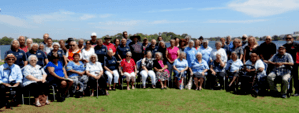Participatory action research with Aboriginal Elders: Ngulluk Koolunga Ngulluk Koort project
Blog post by Clair Scrine
Just how participatory is your participatory action research? Reflections and lessons learned from working with Aboriginal Elders.
Our paper details how we have worked to establish a genuinely participatory role for nine Aboriginal Elders in a five-year action research project focused on early child development in Western Australia. The paper will be of particular interest to those working in this space given how few research studies engage with Aboriginal Elders in this way. Typically, mainstream research projects opt to gain Aboriginal Elders’ input via an advisory or consulting role. Our paper details the Elder’s authority in the design, conduct and outputs of the research in order to ensure the project adheres to a decolonizing process and Aboriginal people have power and voice in ways that prioritise their values and beliefs. We believe the paper provides some methodological lessons for Aboriginal research more broadly, and some food for thought for researchers wanting or those believing their work to be, truly participatory and decolonising.
Collaborative, relational, participatory and reflexive research is not straightforward or easily achieved and this paper is insightful for its reflections on the challenges we experienced. It does not shy away from detailing some of the frustrations and misunderstandings experienced by the Aboriginal and non-Aboriginal project members. Ultimately however, we would argue that non-Aboriginal researchers must expect a level of discomfort if they are committed to transformative practices that support Aboriginal peoples’ self-determination.
*The nine Elder co-researchers report back to Perth’s broader Aboriginal Elder community who gave the initial authorisation for the project to proceed
We invite you to learn more about this experience by reading our article HERE. Free 15-day access is available for this article beginning 12 October.
After you’ve had a chance to read this piece, please share your thoughts, ideas, or experiences with our community in the comments section so we can continue this discussion!
- Making Public Deliberations Inclusive with Mixed Methods AR - October 26, 2020
- Participatory action research with Aboriginal Elders: Ngulluk Koolunga Ngulluk Koort project - October 12, 2020
- Bringing the relational self to ART: Interview with Dr. Yvonne Skipper - October 1, 2020

